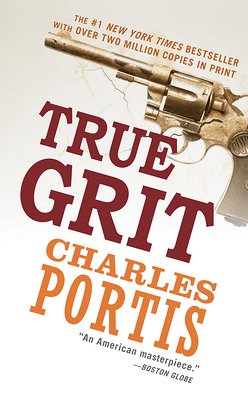APS TOGETHER
Day 1
Reading: From start (p.9) to p.27 ("Then I slept all right.")
September 3, 2020 by Ed Park
Here is our narrator, Mattie Ross—and a sense of both her directness and quirkiness (in that kicker: “although I will say it did not happen every day”). Best of all, you can’t *not* keep reading.
“People do not give it credence that a fourteen-year-old girl could leave home and go off in the wintertime to avenge her father’s blood but it did not seem so strange then, although I will say it did not happen every day.”
“Here is what happened.” No beating around the bush for our Mattie. She’s from “Dardanelle in Yell County,” Arkansas. “Yell County” is a perfect place-name for someone of her feistiness.
Can’t resist adding that in My Life, Bill Clinton mentions his step-grandparents are “from Dardanelle, in Yell County.”
Watch how Mattie quickly captures other characters—straightforward descriptions that wander into trivia. Tom Chaney, Frank Ross, Yarnell Poindexter (who “passed away in the flu epidemic of 1918”).
The phrase “true grit” hasn’t popped up in the story itself yet. For now, think about the word “true” and how it might frame what we’re reading.
“Here is what happened” (II): Portis has obviously never been a 14-year-old girl who lived in the 19th century; how does he make us believe the story is “true”?
Mattie and Yarnell go to Fort Smith, where her father was killed, riding in the colored coach; the racist porter uses the n-word at Yarnell, Mattie snaps back.
A jarring reminder of the world Mattie is describing—True Grit unfolds during Reconstruction.
By my reckoning, an elderly Mattie is recounting incidents of 1873, from the vantage of 1928, in a book published in 1968—which we're reading in 2020.
Yarnell was born free in Illinois but kidnapped and brought south “just before the war.” Frank Ross fought for the Confederacy. For all the story’s heroism and high spirits, it unfolds against a world of terrible—terrible even beyond the murder of one’s father.
Mattie and Yarnell witness a public hanging. It feels like something out of the Bible: Three men, each with their own style of last words. On a lighter note, Mattie tries her first tamale: “They are not bad. I had not seen one before.”
Mattie's response to the undertaker asking if she'd like to kiss her father in the coffin is as hard-boiled as it gets: "No, put the lid on it."
The sheriff gets Chaney’s name wrong, says he has no authority to chase him in the “Indian territory (i.e., Oklahoma). Mattie asks who the best federal marshal is to hunt him down. Describes three. “The meanest one is Rooster Cogburn.” Mattie determines to hire him.
Mattie stays at boardinghouse where Chaney shot her father. Some “drummers” (traveling salesmen) are guests. Has to share bed with “Grandma Turner,” who steals the sheets. Arranges her father’s blankets. Poignant, no nonsense: “Then I slept all right.”
